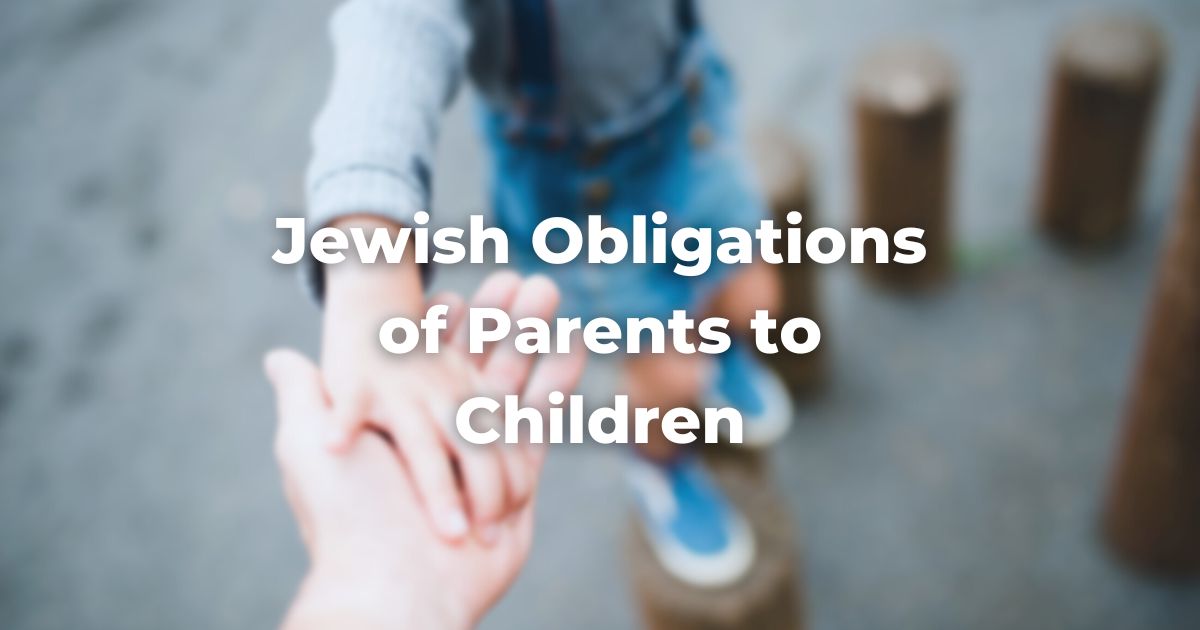Table of Contents
Obligations of Parents toward Children
In considering the obligations of parents towards children we will look at what Jewish sources have to say around this topic. When speaking about family, there is a wide variety of opinions and also a wide variety of situations and relationships.
Parenting is not an easy task, our tradition recognizes that and gives some suggestions.
The MishnahA collection of rabbinic teachings edited in Israel around 225 CE. Organized in six sedaraim by subject matter and dealing with both ritual and civil law. Both the Jerusalem and Babylonian Talmud are expansive discussions of the Mishnah. and TalmudReferring to one of two collections, the Jerusalem and Babylonian Talmuds, edited in the 6th century, that contains hundreds of years of commentary, discussion, and exploration of the ideas in the Mishnah. One could describe it as Mishnah + Gemara = Talmud explore the responsibilities of parents toward children and of children toward parents in tractate Kiddushin (cf. Mishnah Kiddushin 1:7 and BT Kiddushin 29a–32b).
Classical texts often differentiate parental obligations on the basis of the gender of parent and child, but the prevailing view today is that it is best to minimize gender-based differences in this regard.
The sources teach us that parents are obligated to circumcise and redeem their sons, to teach all of their children TorahRefers to the first five books of the Hebrew Bible, the Tanakh, also called the Five Books of Moses, Pentateuch or the Hebrew equivalent, Humash. This is also called the Written Torah. The term may also refer to teachings that expound on Jewish tradition., to teach them a trade, and to see to their marriage.
Some add that parents have an obligation to teach their children to swim as well. (These are in addition to the basic obligation of feeding, housing, and clothing their young children.)
In general, we may understand these ancient obligations to stand for giving children the spiritual, intellectual, physical, and social skills necessary to live productive and meaningful lives.
Teaching Children
The Torah outlines the educational responsibilities of parents toward their children clearly and unambiguously with statements such as “you shall teach these words [i.e., the words of the Shema describing God’s unity and the obligation to love God] diligently to your children” (Deuteronomy 6:7).
Still, although parents may be their children’s first and most formative teachers, most parents will also need to provide professional instructors to complete their children’s education.
The commandment to study Torah, and to teach children how to study Torah, requires that parents band together to provide the finest Jewish and general education possible for their offspring.
Indeed, a solid general education is essential not only for learning marketable skills, but also for stimulating curiosity about, and comprehension of, our remarkable world. But regardless of whether children study Judaism in a full-day or a supplementary program, it is essential that parents reinforce the educational values of school at home.
Each child responds differently to the intellectual challenges of Jewish religion and culture.
Parents should seek to maximize their children’s exposure to the ideas and sacred texts of our religion.
Whether a child is an academic star or a slow learner, the Jewish worth of each lesson learned is infinite. Education must always be tailored to the specific needs and aptitudes of the people to whom it is being addressed.
Even more important than intellectual attainment is the spiritual growth of each individual child.
Are our children learning to become decent, considerate, and altruistic people? Do our children feel loved and, equally importantly, have they acquired the ability to share that love with others?
Have we imbued our children with a sense of purpose in life beyond the acquisition of material goods? Are they learning skills that will equip them to flourish and to contribute to the improvement of the world?
These questions are the benchmarks—we might call them mensch-marks!—by which to measure the education of our children. All are essential elements in the education of children. And none can be ignored or dispensed with casually.
Children rarely appreciate the enormous role that they play in defining their parents’ self-image.
The Book of Proverbs repeatedly speaks of the joy felt by parents when their children act wisely and of the terrible suffering experienced by parents whose children behave badly.
The Yiddish word naches (pronounced nachat in modern Hebrew) captures the special pleasure that parents derive from their children.
Seeing children thrive grants the greatest pleasure to parents; witnessing their suffering is the most terrible torture any parent can experience.
Toward the end of the Book of Genesis, Judah captures this dynamic powerfully in attempting to explain why his father Jacob cares so deeply for his youngest son, Benjamin. He loves him as intensely as he does, Judah explains, “because their souls are each bound up with the other’s” (Genesis 44:30).
Nevertheless, parents must learn to see their child’s development as an internal process, not primarily as a reflection of their own worth. At Proverbs 22:6 we read, “Teach a child in the way to go, and even in old age that one will not stray from it.”
The goal of Jewish parenting is to raise children to adulthood by teaching them to sanctify life and serve as God’s partners in perfecting the world.
No child will advance toward this goal in a straight line, and parents must therefore help their children to discover their own unique interests and to develop those skills that will allow them to contribute most richly to the world around them.
The contemporary idea of “multiple intelligences” that recognizes people’s diverse skill sets accords well with Jewish insights about different types of students. The Talmud astutely notes that “no one can learn Torah except by one’s heart’s desire” (BT AvodahOriginally understood as Temple service, but expanded to mean any service to God.
Related to: gemilut hasadim. See Pirkei Avot 1:2 Zarah 19a).
Recalling the Talmud’s statement in Kiddushin about parental obligations, we see that the first responsibility of parents is to provide their children with the physical and material environment that will allow them to grow up properly.
But beyond feeding, sheltering, and clothing them, parents must guide their children to develop good character.
Indeed, while parental love may be unconditional, it nonetheless comes bundled with many diverse kinds of expectations. In the end, however, parents teach their children by setting a worthy example of commitment to family, community, and to the sacred tradition of Judaism for them to follow in their own lives.
When children reach a milestone of accomplishment, it should be their parents’ pleasure to help them celebrate appropriately.
The Jewish people—which has suffered innumerable set-backs and tragedies—is always eager to celebrate life!
Whether the occasion is a brit milah or a simchat bat ceremony welcoming a baby girl to the community, a bar/bat/b’nei mitzvah, a graduation, or a wedding party, it is essential that Jewish values be incorporated into the celebration.
The Jewish values of hospitality, kindness, tz’dakah, and modesty should be showcased at the times of our greatest joy. This is the proper Jewish way of celebration that parents must teach their children, especially in an age of affluence.
Disciplining Children
In the Bible, God employs persuasion, punishment, and even aloofness in order to motivate stiff-necked Israel to return to the Torah’s ideals.
Famously, the Book of Isaiah opens (at Isaiah 1:2) with a bitter complaint leveled by God against Israel: “I have raised and exalted children, yet they have rebelled against Me!” Yet the role of the prophet is ultimately to help Israel feel that God is reaching out to them, to reassure them of God’s love even at times of estrangement.
So too must parents find creative and varied ways to reach their children even when they stray far from the family’s values and practices.
When parents discipline a child, it may be difficult for the child to accept that guidance with love.
Therefore, it is essential that parents begin positively by modeling the type of conduct that they wish to see in their children.
They must also resist the temptation to cover up all of a child’s shortcomings.
Parents whose children do not respond to verbal discipline should institute a logical, reasonable series of consequences to guide their children back to proper behavior. Each child must learn to live within limits established by his or her parents.
Failure to discipline children is an abdication of parental responsibility and may lead the children to what the rabbis called tarbut ra’ah, a vulgar pattern of poor behavior.
Rabbi Shimon bar Yoḥai (cited by Rabbi Yoḥanan in the Talmud at BT Berachot 7b) describes tarbut ra’ah in a home as more painful than the apocalyptic battle of Gog and Magog!
From the story told in the Talmud (at BT Bava Metzia 83b) about his son Rabbi Eleazar—who once assisted the Romans and was thereafter no longer known by his dismayed colleagues as Eleazar ben Shimon (that is, Eleazar, the son of Shimon), but rather as “Chometz ben Yayin” (that is, “Vinegar, the son of Wine”)—we can glimpse how the great challenge of child rearing can be even for some of the greatest of our sages.
The halakhah warns parents not to demand excessive displays of respect from their children, lest the strategy backfire.
Indeed, one reason that a parent is warned not to hit an older child is that the child might be tempted to strike back (BT Moed Katan 17a; see also BT Kiddushin 32a).
The codes of law state that one who beats an older child should be warned that such behavior will more than likely be counterproductive and such a parent should even be placed under a ban (Arbah Turim, Yoreh Deah 240).
Although corporal punishment has frequently been practiced by parents, and is even justified in the Bible at Proverbs 23:13–14, we now understand that the Talmud’s warning against striking older children should be applied more broadly, and not solely because the struck child might strike back.
Parents who hit their younger children risk injuring them both physically and emotionally, and injuring a child is forbidden by Jewish law. Doing so also constitutes an offense against common decency.
The resentments and long-term impact created by the physical punishment of children may have horrific ramifications. Truly abusive parents may forfeit their right to be honored and attended by their children.
Instead, parents must discipline children in a firm but reasonable fashion that reinforces the same positive values the parent is seeking to inculcate.
Adopted Children
What are the obligations of parents to their adopted children?
Short answer: the same as with biological children.
Although the modern practice of adoption differs from customs that prevailed in ancient times, the Bible provides a framework for thinking about the obligations of adoptive parents when it reports on the adoption of Moses by Pharaoh’s daughter, and on Esther’s adoption by her cousin Mordecai.
Adoption itself is deemed intensely praiseworthy.
The Talmud states, for example, that “whoever raises an orphan in his home is considered by Scripture as if [the orphan] were his [own] child” (BT Sanhedrin 19b).
If an adopted child’s birth mother is not Jewish, then the adoptive parents are obligated formally to convert their child with the rituals of circumcision (when applicable) and, immersion in a kosher mikveh under the supervision of a rabbinic court.
The act of adoption places reciprocal obligations upon the child and the adoptive parents (Menaḥem Elon, Jewish Law [1994; reprint, Philadelphia: The Jewish Publication Society, 2003], vol. 2, p. 827). Rabbi Isaac Klein rules that adoptive parents are obligated to circumcise their sons, and adopted children must say Kaddish for their adoptive parents (Klein, pp. 437ff.).
We may extrapolate from this and other rulings that once an adoption is legal according to civil law, the obligations of parents to their adopted children, and of children to their adoptive parents, are absolute and permanent.
Adoptive parents must educate and support their children to maturity; children must respect and honor their adoptive parents until the end of their lives.
Unlike other legal systems, Jewish law does not sever the obligations of an adopted child toward his or her natural parents (Elon, p. 827).
This means that if a child identifies his or her biological parent, even later in life, he or she should attempt to honor and respect that parent, even if the establishment of a relationship rooted in love feels unlikely or unrealistic.
If the biological parent does not want such a relationship, then the child may simply have to respect him or her from a distance.
Authors
-

-



The Observant Life: The Wisdom of Conservative Judaism for Contemporary Jews distills a century of thoughtful inquiry into the most profound of all Jewish questions: how to suffuse life with timeless values, how to remain loyal to the covenant that binds the Jewish people and the God of Israel, and how to embrace the law while retaining an abiding sense of fidelity to one’s own moral path in life. Written in a multiplicity of voices inspired by a common vision, the authors of The Observant Life explain what it means in the ultimate sense to live a Jewish life, and to live it honestly, morally, and purposefully. The work is a comprehensive guide to life in the 21st Century. Chapters on Jewish rituals including prayer, holiday, life cycle events and Jewish ethics such as citizenship, slander, taxes, wills, the courts, the work place and so much more.
View all posts





